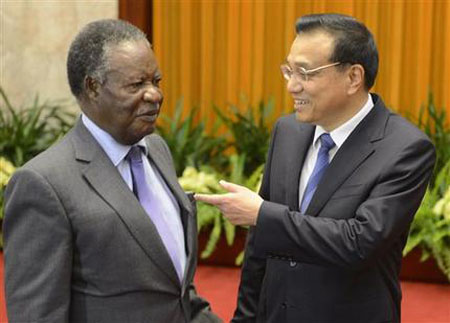
In this Saturday April 13, 2013 file photo Chinese Premier Li Keqiang, right, talks with Zambia’s President Michael Sata before a meeting at the Great Hall of the People in Beijing, China. Zambia’s relationship with China is growing quickly, spurring development but also friction. While there is gratitude for the scarce jobs and new infrastructure that China has bought, labor relations are sometimes tense and some Zambians claim they are being exploited. (AP Photo / Yohsuke Mizuno, Pool, File)
LUSAKA, Zambia (AP) — On Lusaka’s Great East Road, the image of a young Chinese woman beamed from a recent billboard encouraging participation in Zambia’s census, a symbol of how much China has weaved its way into the nation as a donor, investor and partner.
Zambia’s relationship with China is growing quickly, spurring development but also friction. While there is nationwide gratitude for the scarce jobs and new infrastructure that China has brought, labor relations are sometimes tense and some Zambians complain they are being exploited.
This complex relationship between China, a global economic giant, and a financially struggling country is one being played out across Africa. The issues are particularly acute in Zambia, where census data shows that about 100,000 Chinese live and more than 500 Chinese companies are engaged in farming, retail trade, pharmacies, hospitals, information and communication technologies as well as road-building, mining and manufacturing.
This week Chinese investors made a bid to expand even more into a continent that is rich in natural resources and seen as an area with strong potential for growth at the “Africa Infrastructure and Power Forum” held in Beijing. Top executives from Zambia’s power company as well as officials from key ministries such as commerce and mining are attending the event, slated to end Friday.
Other African countries seeking more business with China included South Africa, the continent’s biggest economy. South African Deputy President Kgalema Motlanthe this week ended a trip to China, the African country’s top trading partner. Trade volume between the two countries has grown to $20 billion. In Zimbabwe, Chinese investment has increased so much that Chinese-language signs greet visitors arriving at the international airport in Harare, the capital.
In Zambia, a country of 14 million people with a GDP of $20 billion, the impact of China has been enormous.
“The Chinese have changed Zambia,” said Nelson Mwendabai, a retired civil servant who ticked off Chinese-backed projects: a railway between Tanzania and Zambia, new roads, schools, clinics and stadiums. Mwendabai said: “We should just accept that they are our friends.”
Zambian President Michael Sata criticized the Chinese presence as an opposition leader, seeking to harness nationalist unhappiness with Chinese accused of taking jobs from Zambians by engaging in low-pay jobs such as pushing wheelbarrows at construction sites. He changed his tune after his Patriotic Front party won elections in 2011. In April, Sata went to China on an 11-day state visit, soon after new Chinese ruler Xi Jinping took office.
“I have come to say ‘thank you’ for the work the Chinese are doing in Zambia,” Sata told Xi.
Relations between Zambia and China date back to Zambia’s independence from British colonial rule in 1964. The real Chinese push begun in the past couple of decades, as China expanded rapidly and sought natural resources to feed its economy. China’s accumulated investment in Zambia stands at over $2.5 billion, mostly in mining and metal refining.
Chinese mining of Zambia’s copper reserves is an important ingredient in China’s industrial production, said Zhou Yuxiao, China’s ambassador to Lusaka. Chinese mines are expanding into Zambia’s northwest Copperbelt region, where fresh deposits of copper, gemstones, uranium and traces of oil have been located.
Chinese investment is expected to grow even more when industrial parks go into full production in 2015, allowing companies to manufacture and export tax-free goods. All these Chinese activities are being serviced by the Bank of China. China is also helping Zambia overcome electricity shortages by building a $2 billion hydro-electric project, part of which will start operating in December.
The benefits of China’s presence, however, are tempered by outbursts of tension and even violence between Chinese managers and many Zambian workers who accuse them of poor pay, bad working conditions and inadequate safety regulations that have cost lives on occasion.
In one incident, four Chinese men involved in the mining industry were accused of paying for sex with minors. A magistrate later ordered them to be freed, saying police had bungled the investigation, but critics speculated that authorities had been bribed to drop the case. Separately, earlier this year, 400 workers working at a Chinese-operated mine complained of ill treatment for being held underground for three hours while an elevator was repaired; managers refused to pay them overtime despite protests from union officials.
Complaints about Chinese business practices in Zambia stretch back years and often are pointed to as examples of problems with Chinese investors across Africa. In 2005, an explosion at a Chinese-owned factory in northern Zambia killed 51 Zambian workers. In 2010 two Chinese managers were accused of shooting coal miners during a labor dispute. Months later, the mine agreed to pay compensation to 13 injured workers, and attempted murder charges against the managers were dropped.
But for Precious Kunda, China is essential. She runs three shops in Lusaka that sell dresses and women’s accessories from China and she imports Chinese building materials for sale in Zambia.
Kunda said succintly: “They are cheap.”
